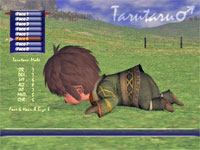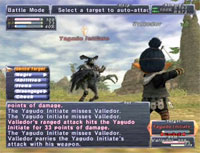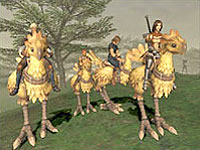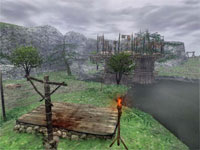




 | 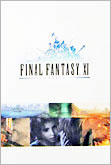 |
| |||||
|
|
My love for Square-Enix's Final Fantasy series is a passionate affair. As I've mentioned several times in the past, I've been a lifelong FF-a-holic from the release of the black-screened original on the old NES to their latest, price-popping expedition on the PS2. For nearly fifteen years now, I've been attached at the hip to these games, with their unfathomable ability to reinvent themselves without losing the charm that defines them. And though I initially balked at the idea of paying a monthly fee to enjoy the newest chapter, (not to mention the bulky hundred dollar investment required just to set the thing up) I'd be lying if I said I was never excited about its potential. The kind of inner turmoil I felt about possibly passing up a new FF was disturbing to say the least. I'm surprised I didn't go through dry heaves or full seizures at the mere suggestion the idea. And, yes, in the end my addiction won out. I shelled out one hundred dollars for FFXI and the accompanying PS2 hard drive (which, I justified to myself at the time, was worth the hundred bucks on its own, really.) Now that I've swallowed the price tag, ventured my way around the fabled world of Vana'diel, paid my first monthly fee and had a couple of months to really sink my teeth into the famed series' first expedition into internet gaming, I feel I'm justified in saying my first impressions were ultimately correct; there's something missing. Taking nothing away from the game itself, the mechanics, the graphics, the diversity or the community, this is as much Final Fantasy as it is Everquest. Somewhere in the transition from Tidus, Yuna and Auron to the millions of participants in the story of FFXI, Square-Enix's trademarked personality was lost. This is a Final Fantasy stripped of that which defined it so starkly from its competition in each previous incarnation. Playing FFXI is like standing next to your best friend as he lies in a coma. Sure, the body's the same... the features look right, and maybe some days he'll get to the point where you'll swear there's a glimmer of life flickering in his eye, but his heart and soul are missing. He's the same, but... NOT the same. You'll run into Cactuars, you'll ride Chocobos, you'll summon Ifrit and Shiva... but they all suffer from the same syndrome. They stare, blankly, and go through the usual motions without half their prior enthusiasm. The game's charm is notably missing, and that single problem casts a long shadow over the release itself, no matter how good or bad it honestly may be. There's not a man or woman alive who coughed up the dough for this large, white box who was expecting what they ultimately got out of it. To its credit, Square-Enix accomplished the one task I thought was perhaps too ambitious for their own good; this no longer feels like a handful of cities staggered around a generic, small-scale globe. Chapter eleven in the Final Fantasy saga honestly feels like an entire, self-sufficient world of its own. Both the casual wonder and everyday monotony of regular life on an untamed planet are portrayed in this title with frightful ease. You'll stroll past literally hundreds of full-time fishermen on any one day, spending their online lives (and their twelve dollars a month) performing the same task over and over again, and enjoying themselves all the while. You'll overhear a petty conversation between two strangers almost every time you're not in the wilderness. And, every once in a while, you'll see something that takes your breath away. For instance, the first time I saw an airship splash into the bay just outside my hometown and coast gently up to the port, I was absolutely taken aback. This was no pre-rendered cutscene, there was no dramatic accompanying score or exaggerated lighting effects... it was just another day in the lives of most everybody there, as these ships come and go several time a day. And that sense of "nothing special to see here" only made the moment all the more relatable and exciting. It was like the first time I stood next to a skyscraper and looked up. It was there, it was happening and it was amazing, but it wasn't the only thing in the entire world. Time didn't stop for it, the camera didn't pan to it dynamically. It delivered this childlike sense of awe and discovery rooted in reality that I've never, I repeat, never experienced in a video game before. Likewise, I was genuinely floored when I first ran into a friendly, helpful player-controlled character. And then another. And another. And so on down the line. Speaking as a veteran of online play, I can say without a shadow of a doubt that I was expecting to log onto the Square servers to find a gathering the same kind of redundant, childish, mean-spirited players who have frequented (and subsequently spoiled) every other online multiplayer game I've ever experienced. In their stead, however, I was very much surprised to discover not only a healthy play environment, but a large crowd of helpful, concerned, all around level-headed players. If you find yourself in the middle of a fierce, tight battle that has a very good chance of resulting in your own demise, there's nothing nicer in the world than to realize you've become the unsuspecting target of a passing White Mage's Cure spell. If you get in over your head and shout for help, there's a very good chance that a higher leveled player is somewhere in the same vicinity as you are and will gladly lend a hand. If I had to choose one thing that truthfully impressed me about the play of FFXI, it would have to be the sense of community and camaraderie. On that same hand, seeing this massive world hustling around you, encountering all these varied player-controlled and CPU-controlled characters and just trying to find your way from one end of a small city to the other is INCREDIBLY overwhelming. There's so much initial information to absorb, so much going on at any one time that even the most capable of minds will spin within moments of their first connection to the FFXI servers. Now that's a flaw I've noticed with several MMORPGs in the past, so I'd be lying if I said I was surprised to see it in full effect here, but I was hoping the bigwigs and creative geniuses behind the legendary FF series could devise a solution. Instead, you meet half a dozen non-playable characters with a penchant for lengthy monologues and strikingly similar names, gain a brief quest or two and are immediately thrust into the fray. I was stuck in a corner, confused, infuriated and utterly lost within five minutes, and I've been playing digital role playing games for most of my life. Another thing this title shares with its online-genre competition is the notable de-emphasis on any real, compelling, interwoven storyline. There's always this sense hanging over your head that something big might just be about to happen, but it never does. You'll catch little bits and pieces of information from NPCs in various parts of the globe, but it's mostly inconsequential and not all that interesting. There's a very loosely-illustrated theme of competition between the planet's three dominant countries that surfaces from time to time, yet there's no drama. These three nations seem to be on the brink of war with one another, but they're all afraid of the risk involved with making that first move. It's like they built an entire game around the non-playable characters who didn't matter in previous Final Fantasies. If there's one thing I can hone in on as the single aspect that most turned me off to this game, the near-total lack of story it would be. About the only thing conversation with NPCs provides is a new mission (which usually consists of "hey, run over to this part of the world and grab me three feathers") and a tiny bit of reality-based character development. If there's any positive at all about the unremarkable story this game has woven, it's the believability of the men, women and monsters who fill it. These aren't wild, anime-esque individuals with garish clothes and no objections to a random adventurer bursting into their house and looting away, they're generally very plain, unappealing folks who quickly become just another face in the mob. They're more believable thanks to their lack of excitement and unremarkable personalities. If you're rating this thing on visuals, well it's Square so you've gotta know it delivers. This is a gorgeous game, there's no debating it. I wouldn't quite put it at the top of the heap as I did Final Fantasy X when it first arrived, but it'd be a disgrace to say this isn't in the upper echelons of the PS2's visual powerhouses. Enemies are brilliantly designed and reproduced in 3D, weather effects are hauntingly realistic, textures are crisp and spot-on, and the world's three kingdoms each have a visual flair and personality that really set them apart. The colors used throughout this world are a great departure from the bright, shiny shades of the last five games, and actually remind me a great deal of the washed out spectrum used in the first few chapters of Final Fantasy VI. Everyone seems to be wearing some variation of brown, low-contrast yellow, blue, green, or gray. The complete lack of bright colors take another step toward basing the world in reality, and really set a different mood for the game itself. Just make sure you take advantage of the "brightness control" setting in the configuration menu right away, because once night falls or you enter a dungeon the view is almost pitch black. There are four different races on the planet, and each manages to look simultaneously out-there and realistic; Male and Female Humans, Female-only cat creatures, Male-only ogre creatures and Male and Female gnome-lookin' abominations. I was let down by the small number of customizable options initially, (each race has about a dozen possible faces, and each face has a whopping TWO different hair colors to choose from) but the number of different combinations of torso armor, boots, leggings, hats and more ensure you won't exactly fade into the crowd. In addition, the weapon you currently have equipped is also visible on your person, so not only can you see what you'll be using to swing away at the competition without making a special trip to the equip screen, but everybody else in the world can see what you're packin' as well. With that said, some of the outfits they've designed are really, really S&M-friendly. As a level 15 Warrior, the best leg armor I could equip were these horrifically short shorts, (I swear, I could see bare butt cheek) a couple inch-thick leather straps halfway down my thighs and bare, shiny, clean-shaven legs. Add to that my beautiful brown beret and you've got a look that could only really be completed with the addition of a zipper-mouthed gimp mask. The game's musical accompaniment, which has always been one of the shining triumphs of the Final Fantasy series, is way off course with this release. While previous titles had an enormous array of different melodies aiding substantially in the process of setting the game's tone, the short number of memorable tunes this time around is very disappointing. Square's really been in a league of their own for years in this respect; I only recently went back and began playing through Final Fantasy VII, and was amazed how warmly I remembered the opening theme. Each town and character had a unique theme song that set the mood even before you stepped through the front gates or spoke with them, and the variety of emotions the musical score ran was tremendous. In FFXI, each kingdom does have a song of its own, but there are only three of those in the entire game and even their tunes are dull, dreary and unmotivating. It's like the boring color palette seeped into the music and completely removed any trace of emotion. The songs drag on, loop endlessly and have very little in common with previous soundtracks. Gameplay is actually very quick and easy to learn, but seems to rely much more heavily on luck than previous titles. If you're in combat with an enemy, it's not uncommon to miss one another for upwards of three or four turns in a row. Random encounters have been done away with entirely, and you can see (and, if the situation calls for it, avoid) every hostile creature in the field. This raises the interesting issue of determining who gains the experience if more than one warrior goes after the same enemy, and Square tackles it in a simple manner: whoever swings at and / or hits the creature first gets the battle. The other player doesn't even get the opportunity to attack it after it's been "claimed" by the first. If you see a monster you'd like to fight, you merely select it as a target, tell your character to attack, (by firing an arrow, casting a spell or running up to it and taking a swing) and watch the battle unfold. The endless mashing of the "Attack" option has been removed from play, as once you've drawn your weapon and begun a fight, your character will continue chopping away until you tell him to do something else or either he or the monster is dead. Both dealing out and receiving damage builds up your "TP" meter, which has taken the place of the traditional "Limit Breaks," and can be used to fire off a special attack once it's filled sufficiently. Casting magic is as simple as selecting a spell from the small battle menu that appears once you begin a fight, waiting a moment as your character chants, and watching the spell's effects. Using magic is a much more strategic factor in this title, since it's possible to have your chant interrupted by a well-timed attack. Thus, you won't want to hold off on casting that life-saving Cure spell until a second or two before the enemy strikes. That hypothetical sword is double-edged, though, and if you're lucky you can halt an enemy's spell in precisely the same fashion. Retreating from battle is almost impossible. If you've begun a fight opposite a particularly tough enemy and start to gain the sense that you may have bit off more than you can chew, that's pretty much the end of the line for you. You're given the option to run from battle in the same small menu used to cast magic and use special abilities or items, but all that involves is putting your sword away and attempting to sprint to the nearest shelter while the same enemy gives chase, striking and injuring your poor, dying character all the way. You can probably imagine how enjoyable this is when you're literally forty five minutes of real-time play from the nearest safe haven. Maintaining that sense of fair play and enjoyment, if you happen to run past any other enemies during your frantic run for life and limb, they'll join the chase and start attacking you as well. The range of each baddie's attack is suspect in my book, as I've been hit several times by a goblin brandishing nothing more than a dagger at well over 100 yards, and is especially infuriating while on the run. Different enemies have different speeds, and your character will usually be a step or two faster than each of them, so it IS possible to get far enough away to cease your foe's attacks... but that doesn't stop them from continuing the chase anyway. I've been ambushed (and subsequently killed) more than once by a monster I'd run from more than fifteen minutes beforehand, when I thought I'd finally lost him and stopped to heal for a minute... which leads me to the next bizarre gameplay element. If you find yourself nearly drained of HP or MP after a tough battle, you no longer need to waste a set of potions or ethers on yourself to get back up to speed. Instead your character can take a knee, look at the ground and slowly regenerate his or her statistics. And when I say slowly, I don't mean "squat for a minute or two and you're ready to go." From what I gathered in my own experiences and in what I've seen of other players, a significant portion of the game is spent healing. Just fought a monster? Kneel your character and run off to take a piss. Just used up all of your MP? Start healing and head out for pizza. Considering the outrageous price of healing items and the shortage of gil in this game, you'll quickly discover that there is no alternative to this practice. It's really a shame, too, because it completely destroys the pacing and enjoyability of the title. You'll be on an emotional high after killing a difficult boss or series of enemies, then slowly watch your excitement, entertainment and emotion drain away as your character sits silently in the middle of your screen and rests for what seems like an eternity. If you choose to party with other players the waits become even worse, as you've got to hang around until everybody is ready to go. Yes, it's possible to form an alliance with up to five other live, kickin', human-controlled characters at any one time. Giving this gameplay element a try opens up a whole other set of possibilities, since there are hundreds of creatures that a solo player would have no chance of tackling on his own. Likewise, party members can communicate with one another regardless of the distance between, combine their attacks to confuse an enemy, chain a series of battles together without healing in between for an EXP bonus and much more. Joining or creating a party is as simple as finding someone who's interested, targeting them and selecting "Invite" from the window that pops up. If they accept your invitation, their HP and MP will appear directly below your own, and they will appear as a special marker on your world map. Unfortunately, joining a party also means a noticeable loss of experience points after each battle, and dividing up your earnings between members. Generally, my experience with parties was somewhat negative. Even though the option is there to select a "leader" for the group, (it defaults to the one who started the party in the first place) there's no real reinforcement of that role, and you more often than not wind up spreading out like a flock of geese, accidentally initiating two or three battles at the same time, (thus killing the purpose of fighting alongside friends) arguing or heading in multiple directions, turning back to see why everybody's going a different route and then heading in multiple directions again. There's a notable lack of heads-up, take-charge players online, and everyone seems to balk at the idea of playing leader. Add to that the ugly trend of players joining up with your party, accompanying you to the dungeon and then announcing that they have to sign off. Sure, there are rewards... you've just got to have nerves of steel and an unimaginable amount of patience to reap them. Player interactions aren't just limited to chat, parties or occasional cooperation; there's a budding economy to enjoy in this world as well. If you've found too many of any specific item or are just looking for some quick cash, you've finally got an alternative to accepting the discounted prices the shops will offer. Or, rather, two alternatives. Running your own bazaar is one of these options, which basically consists of earmarking certain items in your inventory for sale, selecting a price and going on about your business as usual. A special icon appears next to your name that indicates you have goods for sale, and anyone who's interested in making a purchase need only inspect you. There's a distinct set of advantages to this method; there's no limit to how long you can keep items in your bazaar, you can set your own prices without competition and customers are more likely to buy something from you on the spur of the moment, but there are also some noteworthy disadvantages; your audience is limited to players who are online at the same time as you are, and each item you place in your bazaar takes a slot of your inventory and limits the amount of items you can carry for your own purposes. The second alternative is participation in the world's various auction houses, basically a medieval eBay. While you can approach a much broader audience by using the auction houses, you're also limited by a strict time limit before the item is returned as unsold, and the competition for sales is much more fierce. As a customer, the auction houses are preferable for more common items, but bazaars usually yield the harder to find items. Use of the auction house, however, enables lower level players to get in over their heads, as necessary items for completing early quests are readily available for very reasonable prices. Imagine if, in an earlier Final Fantasy, you were charged with a quest to retrieve a dragon's tooth and return it to the king's quarters before the storyline could continue. If you fought that dragon and he wiped the floor with you, your options were pretty limited; gain some levels and try again or quit altogether. In FFXI, you can just head to the auction house without bothering to try the dragon in the first place, choose from the wide selection of dragon's teeth and return to the king triumphant. It's an addictive little crutch, really, a temptation that you know you shouldn't give in to but find yourself obliging all the same. Controls are understandable and effective, if just a tad too numerous, but I can't imagine how they could've worked any other way. Even considering the amount of possible actions in this game, the various menus, screens, displays and indicators seem unnecessary and cluttered. Performing just about any task beyond attacking an enemy or inspecting a fellow online player's statistics requires the use of a keyboard and / or half a dozen sub menus. Playing a round of Final Fantasy XI seems less like playing a video game and more like preparing an aircraft for takeoff. Everything is named correctly and understandably, and you can perform just about anything you want with patience and attentiveness, but you'd think they would have simplified the process by now. Online play through Square-Enix's servers is an absolute triumph. The sheer number of players in the world at any one time is amazing, and I can only recall one or two instances where I experienced any lag whatsoever. Additionally, they're always throwing in little bonuses, events and surprises to keep the world fresh, exciting and unpredictable. I signed on one evening to find three moogles floating in the middle of town square, surrounded by literally hundreds of players. When I spoke to the moogles, they gave me an egg with a letter printed on the shell. I was dumbfounded until I realized it was the week before Easter. They were simultaneously distributing and hiding little easter eggs throughout the city, and if you gave them the lettered eggs that matched up with the first three letters of your character's name, they gave you a prize. Right before I cancelled my subscription, the moogles were at it again, handing out fireworks to anyone willing to listen. It's a really nice side effect of putting the whole game online; you can customize the experience for any reason imaginable. Communication between players is fascinatingly simple, whether the users are on PS2 or PC, in North America or East Asia. The PS2's ability to use any USB keyboard inherently (for instance, I had a spare Apple keyboard laying around that it recognized with no issue whatsoever) makes the process of typing your messages at full speed a snap, and easy-to-use "universal phrases" (common words and phrases, numbering into the hundreds, that display in perfect translation in every language) makes communicating with players who don't speak English very easy as well. Signing in took a little longer than I'd hoped it would, averaging close to four minutes from the point you turn the power on to the moment you're actually moving a character around on screen, the addition of the HDD slowed down the system's boot speed noticably, and some of the user interfaces could use some refining, (come on... hitting enter after you've typed in your password doesn't submit the field?) but I'll gladly trade that for the kind of smooth online play this title's delivered. As a whole, though, I was disappointed. The magic of the entire line of Final Fantasy games is missing from this title, and even attempting to associate it with its brethren was a mistake. Don't let that fact mislead you, however. As a standalone title with no ties whatsoever to the FF universe, this still wouldn't have knocked my socks off. It's full of unrealized potential, moments that stopped just short of being spectacular and long, dull periods of nothingness. The vast majority of your game time is spent running along an empty path, healing in a corner or participating in a boring, pointless conversation with one of the million useless non playable characters. Its successes are few; the successful transition from full-blown fantasy to a more reality-based setting, the tremendous capabilities of the Square-Enix servers and the gorgeous visuals, and its failures are many; the lack of story, the stale taste of almost everything in the world and the unnecessarily difficult battle system. I've got no problem calling this is an above average game, but claiming it's much more than that would be something of a stretch. Overall Score: 6.8 |


